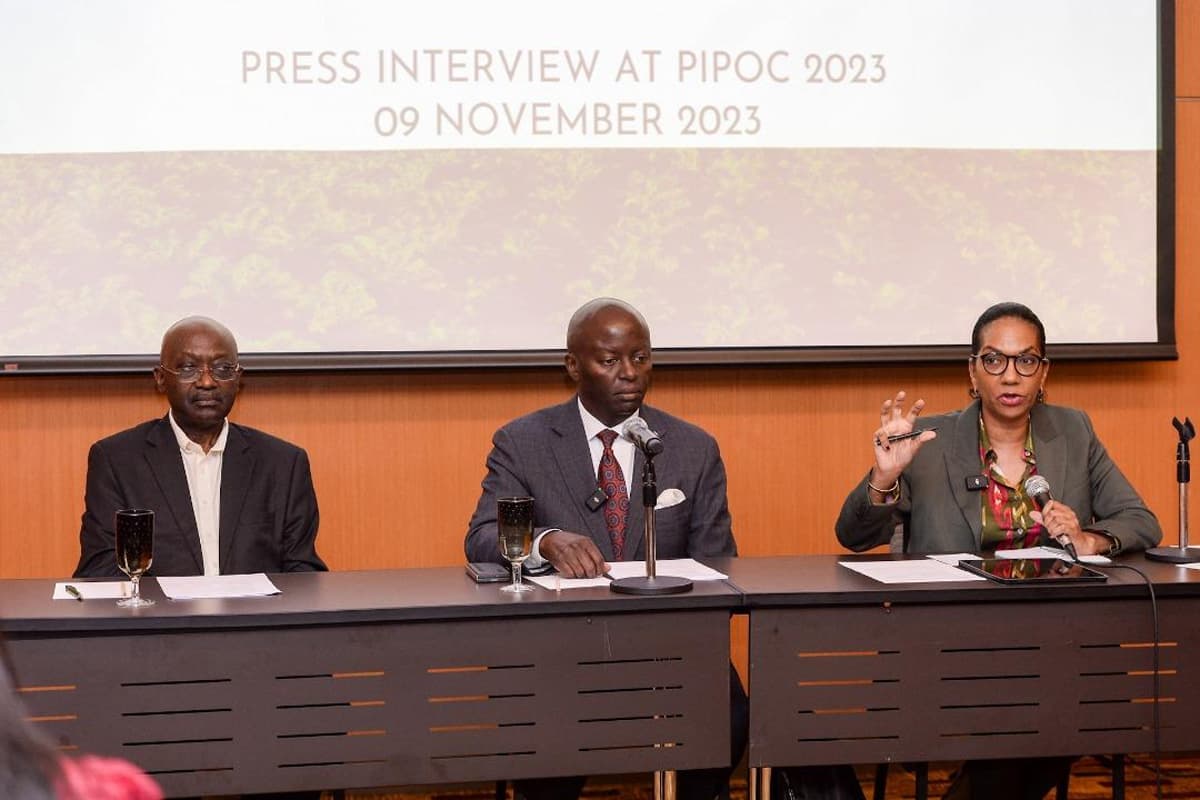

Plantations et Huileries du Congo (PHC), the largest industrial palm oil producer in the Democratic Republic of the Congo (DRC), is on a mission to expand the palm oil market within the DRC and penetrate neighbouring markets in Africa. In order to fulfill this mission, PHC has cast its gaze upon Malaysia, the global leader in palm oil expertise.
PHC already has established relationships with some of the players in the Malaysian palm oil industry as nearly every equipment used in its plantations are sourced from this country. “We are eager to strengthen the existing relationships and forge new partnerships in Malaysia because this country's expert support and wealth of experience are deemed crucial for PHC's ambitious expansion and development endeavors,” said Monique Gieskes, PHC’s director-general, during a press interview held at the recently-concluded MPOB International Palm Oil Congress and Exhibition (PIPOC) 2023.
The exhibition, which gathered over 2,000 palm oil industry players, was organised by the Malaysian Palm Oil Board (MPOB) from November 7 to 9 at the Kuala Lumpur Convention Centre.
PHC’s breeding program: Leveraging Malaysia’s technical expertise
Gieskes, who led PHC's return to profitability, with 77% increase in production within the last three years, also revealed to The Edge that high-level discussions between PHC and MPOB have taken place to foster a strategic partnership that transcends conventional business interests.
The linchpin of these discussions revolves around the ambitious development of breeding palm plants. PHC, bolstered by skilled Malaysian technicians, envisions a holistic breeding program designed not only to benefit both nations but also to contribute significantly to global initiatives, particularly in addressing the European Union Deforestation Regulation (EUDR).
“We are looking at a mutually-beneficial partnership where MPOB helps us with technical support while we provide access to our breeding material, apart from a hand-in-hand collaboration in the research and development of the breeding programme,” Gieskes noted.
The company also aims to attract foreign palm oil companies, especially from Malaysia, to take advantage of the abundance of agricultural lands accessible to PHC. Shaka M. Kariuki, the Co-Chief Executive Officer and Chief Investment Officer of Kuramo Capital Management LLC (KCM), the investment firm that holds 76% of PHC, informed The Edge of its land concession granted by the DRC government and invited palm oil producers to help develop and expand the plantations in the DRC.

“PHC is an attractive investment, especially for palm oil players outside of the Congo, given the fact that we have access to 100,000 hectares of land, but only 25% of these have been utilised. There is demand for palm oil, which translates to the necessity for more plantations, but it is currently not being met,” stated Kariuki. “The palm oil sector (in the DRC) is ripe for expansion, especially for a country with a 100 million population where labour is not an issue,” he added.
At the moment, PHC services 60% of the palm oil demand in the DRC and it is looking to fulfill the country’s demand in the next several years. The company also aims to achieve 2 million tonnes of industrial output in the next 8 years to enable palm oil export to the neighbouring central African countries. Thus, foreign direct investments in the palm oil sector is critical to PHC in ensuring these goals are met.
Going downstream as part of environmentally-sustainable expansion
Crucially, PHC remains steadfast in its commitment to environmental protection, epitomized by a stringent no-deforestation policy. It seeks foreign investments in plantation expansions in the country by utilising abandoned agricultural plots and similarly-designated lands gazetted by the DRC government.
PHC's ambitious growth strategy extends far beyond traditional profit-centric approaches. It also involves multifaceted plans: increasing yield per hectare, setting up a fourth mill, establishing a refinery, and initiating a biogas plant for sustainable energy generation.
Gieskes explained to The Edge PHC’s desire to go downstream with its palm oil products as a strategy to double its business by 2026. “Before expanding our plantations, we plan to increase our yield by building a fourth mill, after which we also plan to build a biogas plant, to treat the Palm Oil Mill Effluent (POME) and generate electricity for both the plants and the surrounding community,” described the PHC director-general.
An investment that goes beyond profit
This plan is not only aimed at increasing PHC’s revenue, but also to serve the communities that live in the towns where its plantations are located. Its chief operating officer, Dr Mpoko Bokanga, told The Edge about the company’s corporate social responsibility efforts in developing and uplifting the communities around its plantations which include building and maintaining schools and hospitals.

“As the largest private sector employer in the DRC with more than 10,000 employees, we have a responsibility to invest in community development. For instance, PHC currently operates 4 hospitals with 400 beds that serve more than 150,000 people every year,” said Bokanga. PHC also provides free healthcare to its employees and their families, while those not employed by the company but live in the plantation areas are provided with subsidised medical services.
“PHC is proof that palm oil is a profitable business in the DRC. Potential partners are not only offered the opportunity to grow and profit with PHC, but also a chance to collaborate with a company that is making significant and enduring impacts on the local communities in the country, and hopefully, beyond. The more we grow, the larger the communities we can help develop. It’s a win-win for everyone,” added Kariuki.
